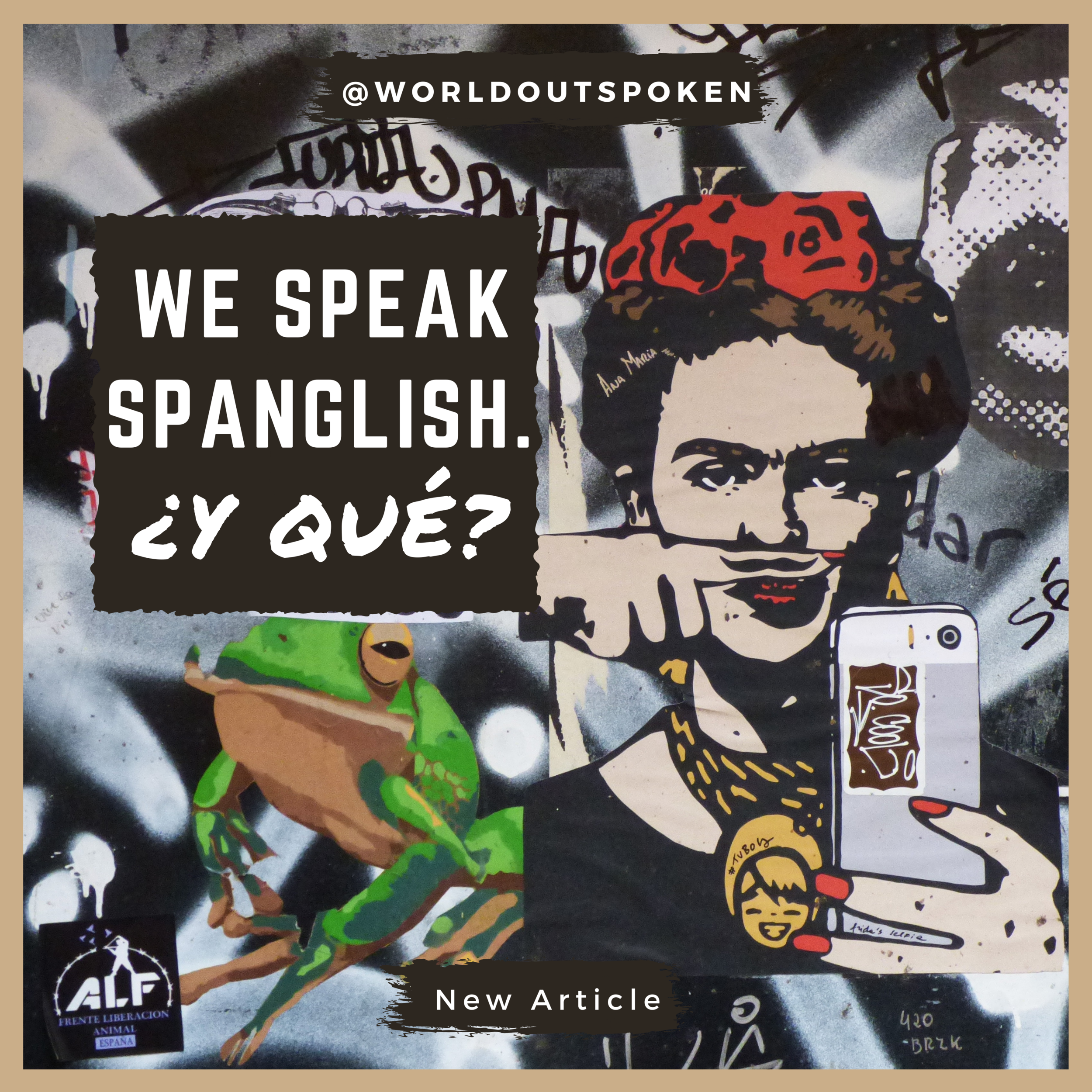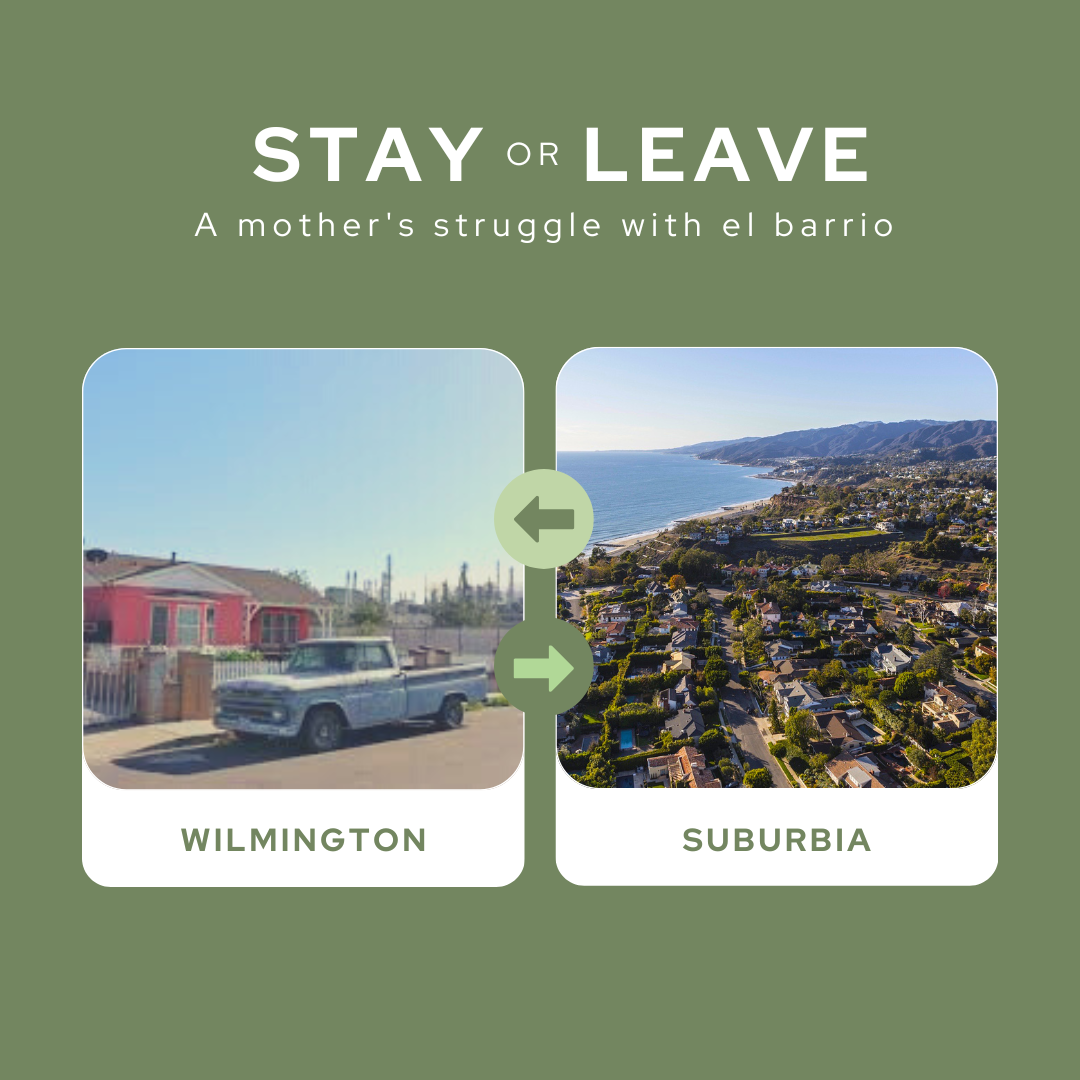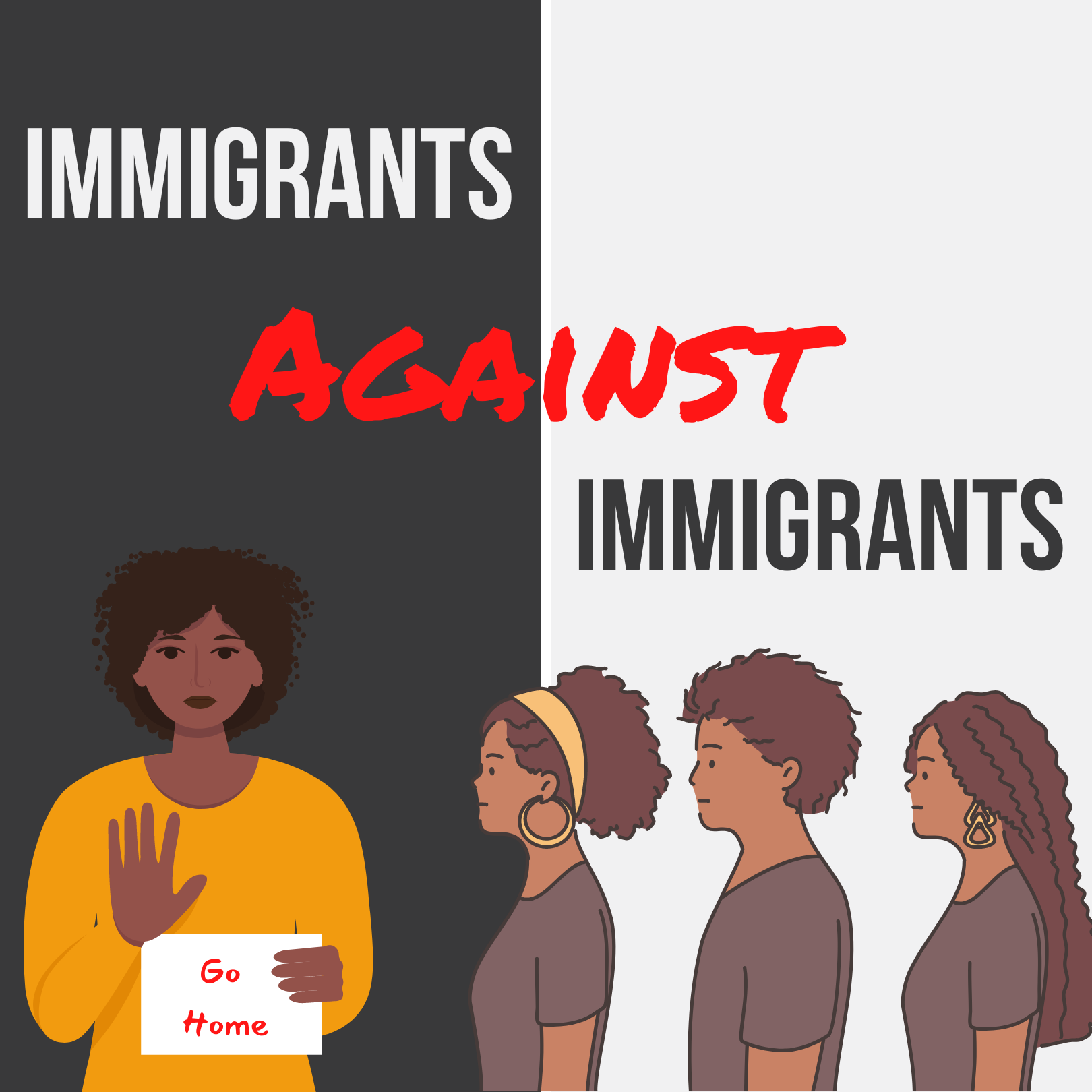My parents are from Mexico but they have lived in the U.S. for over 35 years. I was born and raised in Los Angeles and have lived most of my life in a predominantly Latino community. I am also a Spanish professor. This is the lens from which I am writing.[1]
My dearest Spanglish,
They despise you. They think you’re an abomination, a creature birthed from insufficiency and miseducation. They punish you in Spanish class and beat you in English class. Dicen que eres un bastardo, un malparido.
“¡Habla bien! ¿Por qué hablas mocho? No se dice aplicación, se dice solicitud. No se llama librería, se llama biblioteca. Deja de decir esas barbaridades – jangear, mapiar, lonchar, marketa – Dios mío, le vas a provocar un paro cardiaco a la grandísima, estimadísima y respetuosísima Real Academia Española. ¿Qué diría tu abuela? Mira como se ríen de ti tus tías en México. Tu existencia es un insulto, una vergüenza. No maltrates a nuestra hermosa lengua con tus medias palabras. El idioma se respeta y tú, mentado Spanglish, eres un irrespetuoso”.
That’s what they say, querido Spanglish. But I… I love you. You’re the language of my people, birthed from love and sacrifice. Tu existencia brotó in our communities como las estrellas brotan en el cielo. And when I hear you, I recognize myself and when I utter your words, I know I’m at home, en esa casa that my parents built con tanto sacrificio en una tierra desconocida.
They insist, querido Spanglish, que no existes, but languages are not formed in the cradle de las academias reales. You are not held hostage by official institutions; you are held in the arms of your people and rest on the lips de tu gente.
Tu descendiente,
La Chicana.
Ask ten people in the U.S. Latina/o community what they think of Spanglish and you might obtain ten different answers, but their responses will never be dull. The use of Spanglish provokes emotionally-charged reactions that elicit everything from joyful expressions to furious replies. Renowned Mexican author Octavio Paz once said that Spanglish was, “neither good nor bad, but abominable” (Ni es bueno, ni es malo, sino abominable). Carlos Varo, a Spanish-Puerto Rican author called Spanglish a chronic illness, and Eduardo Seda Bonilla claimed that it was a colonial crutch, a linguistic form that is “characteristic of colonial situations where there is an attempt to eradicate and lower the language and culture of a subjugated nation”[2]. Still today, for many people, Spanglish represents just another form in which colonial English is encroaching into our space. Spanglish, perceived in this vein, is a contaminated form of Spanish that is no longer recognizable, one that bears the violence of colonial traces.
Nevertheless, there are those who vehemently support the use of Spanglish and claim that it enhances their linguistic repertoires. When the question, “Why do some people speak Spanglish” was posed on Quora, a person responded, “Because it’s fun! I enjoy saying that my daughter is malcriada, she had a huge berrinche this morning’ rather than ‘my daughter is badly behaved, she had a huge tantrum this morning’ Spanglish is more fun than either language by itself.”[3]
So, what is Spanglish? Well, linguistically, Spanglish has different manifestations. Perhaps the one most distinguishable is code-switching, when the speaker alternates between English and Spanish in a single conversation. Calques and loan words are also common in Spanglish phraseology.
Code-switching: Fíjate que ayer I went to the store y me compré muchas cremas that were on sale
Calques are literal translations, such as te llamo pa’tras (I’ll call you back; te llamo después), tener buen tiempo (to have a good time; pasarla bien), hacer decisiones (make decisions; tomar decisiones)
Loan words: lonchar (to have lunch; almorzar), el mol (the mall; el centro comercial), friser (freezer; congelador) mapear (to mop; trapear), checar (to check; revisar), breik (break; descanso), brecas (car brakes; frenos)
Regardless of whether you personally love or hate Spanglish, it is important to acknowledge that Spanglish, similar to all languages, is rule-governed, guided by grammatical and social principles. Speakers of Spanglish abide by certain rules, albeit unconsciously, just as native speakers of Spanish and English construct sentences with ease without being cognizant of the grammatical rules that guide their speech. Read the following examples:
Fernanda wants el ice cream from the casa de my madre.
José se enojó and he gritó.
Lorena me va dar un raite once she’s done with work.
Estoy jugando soccer with Blanca.
I surveyed twenty Spanglish speakers, asking them to identify the ones that sounded “wrong” to them and their answers revealed a high degree of consensus, as was expected. Although the four examples given above are all written using hybrid speech, not all sound right. Numbers one and two are not natural Spanglish expressions, while three and four represent normal incidences of code-switching. Interestingly, two people responded that all sentences were problematic because they were written in Spanglish, perhaps echoing what they’ve heard their whole lives – that Spanglish is incorrect.
In reality, Spanglish isn’t wrong or right, it just is, and perhaps that’s the beauty of it. Spanglish is patterned but these patterns can change over time and are extremely malleable. People can’t correct you in your Spanglish, the way they would with Spanish or English, for example. Spanglish is not a made-up language either. We didn’t make up Spanglish – Spanglish is a natural expression of who we are as bilingual and bicultural individuals living in liminal spaces. I can’t tell you how I learned Spanglish. I can tell you that I learned Spanish at home and English at school and that my life was not as linguistically compartmentalized as some might think because my friends spoke English, but also Spanish and my family spoke Spanish, but also English and I embraced that through Spanglish.
Spanglish, similar to formally recognized languages, has distinct varieties, or dialects. Ilan Stavans, who wrote an adaptation of Don Quixote in Spanglish and authored Spanglish: the Making of a New American Language (2004), explains,
“There is no one Spanglish, but a variety of Spanglishes that are alive and well in this country and that are defined by geographical location and country of origin. The Spanglish spoken by Mexican Americans in, say L.A., is different from the Spanglish spoken by Cuban Americans in Miami or the Spanglish spoken by Puerto Ricans in New York. Each of these Spanglishes has its own patterns, its own idiosyncrasies.”[4]
Moreover, Stavans indicates that generational and geographical differences also impact the type of Spanglish that is spoken by each group. Similar to English and Spanish, Spanglish has many dialects that are influenced by a myriad of factors, including communities of contact, age, and social status.
I remember my cousins in Mexico exclaiming, ¿cómo pueden hablar así? when my cousins from the U.S. and I visited Mexico and spoke to each other in our comfort tongue. It wasn’t a question that denoted disgust, but admiration. They thought it was fascinating that we could switch between languages in the same sentence with such ease and they asked us to teach them, the same way they had taught us to speak “el idioma de la F”[5] but we couldn’t teach our Spanglish because we had acquired it organically as part of our identity as U.S. Latina/os.
I know many people in Mexico that speak English as a second language and Spanish as their native tongue, but they cannot produce Spanglish. Similarly, many native English speakers who learned Spanish as a second language are unable to speak Spanglish. Simply knowing both languages does not guarantee Spanglish proficiency. So, what is the breeding ground of Spanglish? Spanglish was born in the United States. It is in this country, in Latino communities, where it flourishes.
Dr. Almeida Jacqueline Toribio, a professor at UT Austin who has been studying bilingualism for decades claims that, “CS [code-switching] remains a stigmatized bilingual behavior, viewed as a failure on the part of the speakers to ‘control’ their languages […] Some see it as a lack of competence or even poor manners”.[6] Often times, the assumption is that speakers of Spanglish are lazy, deficient or ashamed of the Spanish language.
There’s a constant safeguarding of dual spaces and we are asked to split ourselves and to not “cross-contaminate.” This is an impossible request and one that should not be made. “To survive the Borderlands, you must live sin fronteras,” affirmed Gloria Anzaldúa. English says, “Spanish is prohibited in my land” and Spanish replies, “Este es mi territorio, fuera el inglés” and Spanglish thrives, sin fronteras. Spanglish does not attempt to usurp either language; it is its own mode of expression. Do you criticize burritos for not being taco enough?
I told you earlier that I’m a Spanish professor pero yo no respeto el español because languages are not meant to be respected – people are. When you tell people that Spanglish es una forma incorrecta de hablar, you’re really telling them that who they are is a “wrong” version of themselves, one that should be rejected. I know it can be difficult for a lot of immigrant parents to accept that their children are culturally and linguistically different from them and, to a certain extent, I understand why so many first-generation Latina/os are resentful of Spanglish. However, we can’t forget the fact that there are millions of individuals who identify as Latina/o but were born and raised in the U.S. We were not raised in our family’s countries as monolinguals. We do not have the same culture as our parents, but mainstream U.S. culture does not represent us either. We’ve created our own spaces and have formed new cultural expressions that should not be viewed as tainted versions but as unique creations. Hablamos espanglish because it’s who we are.
“Until I am free to write bilingually and to switch codes without having always to translate, while I still have to speak English or Spanish when I would rather speak Spanglish, and as long as I have to accommodate the English speakers rather than having them accommodate me, my tongue will be illegitimate.
”
ABOUT DRA. ITZEL meduri soto
As an academic from el barrio, Dra. Meduri Soto strives to engage in scholarly work that honors and gives visibility to her community. Her faith drives her passion for justice as she seeks to reveal the ways in which certain language ideologies are constructed to operate unjustly against our communities. Her work acknowledges language as a powerful tool and promotes linguistic diversity in its different manifestations. Bicultural and bilingual identities are at the center of Dra. Meduri Soto’s work. She is a Spanish professor at Biola University where she teaches second language and heritage language learners. To learn more about her work, follow her on Instagram: @la.dra.itzel
Footnotes
[1] Poem titled, “Querido Spanglish” by Itzel Reyes (2021)
[2] “Réquiem por una cultura: Ensayos sobre la socialización del puertorriqueño en su cultura y en ámbito del poder neocolonial” (1970).
[3] https://www.quora.com/Why-do-some-people-talk-spanglish
[4] As quoted here: https://people.howstuffworks.com/spanglish.htm
[5] “El idioma de la F” is not an actual language. It is a playful way in which children could speak “in code” by adding the letter F to every vowel. For example, “te amo” would be “tefe afamofo”. I learned how to speak this “language” in Mexico and it was mainly used when we didn’t want the adults to understand our dialogue.
[6] As quoted on, “Love it or hate it, Spanglish is here to stay and it’s good exercise for your brain” (2018).
Articles like this one are made possible by the support of readers like you. Donate today and help us continue to produce resources for the mestizo church.









